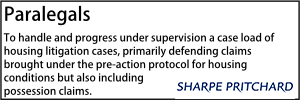



Automatic suspensions and the public interest
News
Ashfords bolsters procurement team with partner hire
Hugh James expands commercial team with partner hire
Must read
Families refusing access to support
Features

Local government reorganisation: the impact on procurement and contracts

The Procurement Act 2023 and new homes

Navigating automatic suspensions

Contracting authorities and pipeline notices

Lifting the automatic suspension: the need for evidence
Webinars
Social Partnership and Public Procurement (Wales) Act
More features
Seeking clarification of tenders
Impending Procurement Act: What you need to know
AI and procurement
Social Partnership and Public Procurement (Wales) Act
Why should you sweat the (seemingly) small stuff?
Procurement Act government guidance – Perhaps 'not a reliable method of interpretation of the law'?
Contract management and performance
The Procurement Act 2023 and development agreements
The National Procurement Policy Statement – an opportunity for mission driven procurement?
Procurement Act 2023: Are you ready?
Modification of contracts existing before the go-live date of the Procurement Act 2023
Unpicking the Procurement Act Episode 4: Challenges and Remedies
Unpicking the Procurement Act Episode 3: Contract Modification
Unpicking the Procurement Act Episode 2: Exclusion and Debarment
Unpicking the Procurement Act Episode 1: Overview and New Procedures
Dynamic purchasing systems and below threshold contracts
Procurement Act 2023: Light Touch Regime
Procurement Act guidance on frameworks is out – Buyers beware!
Local authority owned companies and the Teckal exemption
Challenges to exclusion
Challenges to exclusion
Update on limitation periods
The new procurement regime approaches
Before, during and after a waste procurement process
Disclosure in procurement disputes
The Procurement Act 2023: "go-live" confirmed
Improving social value: a private sector perspective
What’s in the Pipeline?
Procurement Act 2023 – Teckal & Hamburg Exemption
Procurement Act 2023 – Relaxation of section 17 Local Government Act 1988
Careers News
- Details
The widely predicted shake-up of the UK's legal services market gathered pace today after it was revealed that Australia's Slater & Gordon – the world's first stock exchange listed law firm – is to buy Russell Jones & Walker for £53.8m.
The move, revealed in an announcement to the Australian Securities Exchange, is subject to the grant of an alternative business structure licence by the Solicitors Regulatory Authority.
Under the deal, which is expected to complete in April, Slater & Gordon will pay £36.4m in cash and issue £17.4m in shares. Of the cash element £3.8m will be deferred for up to two years subject to performance milestones and £10.3m will be used on completion to repay bank debt of the RJW partnership. The issue of shares is subject to restraints on sale for a minimum period of four years post completion.
RJW has around 425 staff based across 10 locations in the UK. The firm sees around 60% of its revenues come from personal injury litigation, while it also owns the Claims Direct brand.
Slater & Gordon managing director Andrew Grech said: “We have researched the UK market for the past three years and studied more than 30 law firms in the UK.
“We will be among the first to take advantage of a number of significant changes which are occurring in the legal profession in the UK.”
Grech also claimed that Slater & Gordon’s five years’ experience as a listed company gave it a “huge advantage”. He added: “We can bring that experience to the UK through a kindred firm in RJW, which has the business structure and the people to exploit that advantage.”
Neil Kinsella, RJW’s Chief Executive Officer, said the deal would give the firm the resources and backing to develop and grow.
“We want to become the largest and most trusted provider of personal legal services in the UK,” he said. “Our commitment to making justice and legal services accessible and affordable to all remains, but our ability to do this increases as a result; this development will bring real benefits to our clients and affiliated organisations.”
Last week it was announced that Quindell Portfolio, described as a brand extension company, had agreed to buy Silverbeck Rymer, another leading personal injury law firm, for £19.3m.
- Details
The Law Society President has said he envisages the time coming when the barrister/solicitor distinction will be “more a decorative than a functional aspect of our legal constitution”.
In a speech at the Said Business School in Oxford this week, John Wotton suggested that the changing nature of the legal market – including the advent of alternative business structures – would be a driving force for change.
Wotton said: “The new modes of practice will increasingly challenge the norms under which lawyers practise under the separate titles of barrister and solicitor.
“I believe this development will lead inevitably to the need to revisit the question whether these two professions should continue to be separately trained, represented and regulated, as they have been for the past 180 years.”
The Law Society President, a consultant at City giant Allen & Overy, insisted that he did not expect the professions to fuse. He said he assumed that the two separate professional titles of barrister and solicitor would survive for the foreseeable future, “if only because there is no strong current of opinion in favour of fusion on the part of members of the professions or their clients”.
Wotton added that the future might see the distinction between barrister and solicitor be “more a matter of tribal culture than function, rather like the distinction between a Cambridge and Oxford degree”.
However, he argued that education and training was likely to converge and that more advocates would start their careers in law firms rather than barristers’ chambers.
Wotton said: “There must be competitive advantages and efficiencies to be gained from having the full range of dispute resolution services under the same roof.”
He added that it was “entirely rational” for corporate law firms to recruit experienced barristers.
The Law Society President noted the Bar’s move to adapt its traditional, sole practitioner, chambers structure to compete more effectively for legal aid contracts and other work, which he suggested appeared to be a recognition of the imperatives of the current market.
“But will it make sense for somewhat artificial structures to be set up, such as a ‘ProcureCo’ established by a set of chambers to enter into legal aid contracts, procuring advocacy from the members of chambers and litigation from solicitors, when any mixed solicitor/barrister, SRA-regulated practice can provide an integrated service?” he asked.
“Given the multiplicity of providers in the market for most types of work, it seems unlikely that attempting to sidestep the conflict of interest issues that arise within a partnership, by retaining the vestiges of independent sole practice, will be sufficient to justify the additional costs of establishing such structures.”
Wotton also argued in his speech that the regulatory structure under the Legal Services Act would be capable of maintaining the independence and standards of the legal profession and operating successfully in the new environment.
However, he urged the Legal Services Board to recognise the limits of its statutory remit and the approved regulators acting independently of the LSB.
- Details
Local authorities are increasingly opting to recruit lawyers on a permanent basis, a leading public sector recruitment firm has reported.
In the October 2011 of Badenoch & Clark’s Professional talent spotlight, Duncan Ward, Operations Director (Legal), also said that the recruitment freeze in central government was thawing.
On the local government legal jobs market, Ward said: “Despite ongoing hiring freezes within a large number of organisations, recruitment for ‘critical hires’ remains. Due to the additional red tape now involved in both temporary and permanent hiring, there has been a sharp increase in the number of local authorities opting to recruit on a permanent basis, to secure headcount over a longer period and minimise lengthy processes.”
On Whitehall, he said: “With some departments in central government realising that it is generally more cost effective for them to deal with complex legal work in house rather than outsourcing to a law firm, there has been an uplift in demand for commercial lawyers in central government. The Government Legal Service is now recruiting for a number of departments, with a focus on commercial law and litigation as a result.”
See this week’s jobs and sign up to receive our weekly jobs alert.
- Details
The Solicitors Regulation Authority has urged solicitors with higher rights of audience to complete a questionnaire on the way in which they exercise their higher rights.
The information gathered will then be used to feed in to the controversial Quality Assurance Scheme for Advocates (QASA).
The questionnaire has been designed in co-operation with key stakeholder groups, including the Law Society. It will be sent this week to all higher courts advocates with crime or crime/civil higher rights of audience.
“The responses will feed into further evidence gathering which is being conducted to find out more about the types of work solicitor advocates undertake, its nature and extent, as well as personal profile data which will be used in the analysis,” the SRA said.
Yve Schelhaas, the regulator's Director of Education and Training, said: "The recent forum we held on QASA and the consultation on the proposals aired some key issues around the detail of the scheme. We have listened to the views expressed and as the main regulator of the solicitors' profession, we wanted to gather more evidence on solicitor advocates' work so that we can identify any factors that would tend to disadvantage them in relation to the scheme.”
QASA has been designed with four levels, which are mapped to complexity of work. Level one applies to advocacy in the magistrates' courts, for example, while level four applies to the most complex cases in the Crown Court. A single set of advocacy standards will apply across the four levels.
The original intention was to launch QASA in December 2011, but this was postponed after the regulators behind the project admitted that “valid issues” had been raised during consultation. It is now set to be rolled out in April 2012.
Local government solicitors are amongst those to have expressed concern, warning in particular that there would not be a level playing field between barristers and solicitor advocates handling regulatory work.
- Details
Dr Mirza Ahmad, the former Corporate Director of Governance at Birmingham City Council, is to become a tenant at a leading set of chambers, it has emerged.
He is expected to focus at St Philips on legal, ethical and corporate governance work associated with local authorities. The set is one of the largest in the country with 167 barristers.
Dr Ahmad will also continue with his management consultancy, MA (Law & Governance), which he set up when he left Birmingham at the end of July after 11 years at the authority. His departure came after a corporate restructuring that affected a number of chief officer posts.
Dr Ahmad was President of the Association of Council Secretaries and Solicitors in 2009/10. He is chairman of the Bar Association for Local Government & the Public Service.
- Details
Local government lawyers were to the fore at the Law Society’s Excellence Awards 2011 last night.
The Director of Law & Governance at Kent County Council, Geoff Wild, was named Law Management Section Leader of the Year, while Naomi Bentley-Lawson of Warwickshire County Council was named Solicitor of the Year (In-House).
Wild was recognised for his work in building Kent Legal Services into a practice with more than 100 lawyers, a turnover of £7m and a profit centre of £1.75m a year. The service now delivers legal advice to more than 300 public sector bodies.
The citation for his award said: “Geoff Wild leads a service that makes a difference and is widely regarded as an exceptional leader who continues to directly and decisively contribute to the health and success of Kent County Council and the whole of the UK public sector.”
Bentley-Lawson is a child care specialist at Warwickshire. The citation for her award read: “With five years’ PQE, Naomi is already an expert in her field of child protection, and has earned the respect of Warwickshire County Council’s social workers and all 24 experienced lawyers she leads.
“Naomi is unflappable and intelligent, bringing the sort of common sense to law that cannot be taught.”
Rashidah Conroy of the General Social Care Council had also been shortlisted in the Solicitor of the Year (In-House) category, notably for securing the first conviction of an unregistered social worker.
In addition to Wild's nomination, Kent Legal Services saw Karina Vickerman shortlisted for the Legal Executive of the Year category. However, the winner in this category was Philip Warford of Renaissance Legal.
South Lakeland District Council had been shortlisted for the Excellence in Learning & Development award, but this went to City law firm SJ Berwin.
Notable winners included:
- Legal Personality of the Year: Jo Cooper of Perren Buildings Chambers, for his work promoting the cause of solicitor-advocacy
- Solicitor of the Year (private practice): Michael Schwarz, Bindmans
- Junior Lawyer of the Year: Saadia Khan, Bindmans
- AWS Legal Business Woman of the Year: Allison Page, DLA Piper
- Excellence in Client Service: Douglas Wemyss Solicitor
- Excellence in Innovation: Last Cawthra Feather
The awards were presented at a ceremony at Old Billingsgate.
Page 83 of 88
Head of Governance & University Solicitor
Senior Lawyer - Advocate
Assistant Director - Legal & Governance
Director of Legal and Governance (Monitoring Officer)
Events

Events

Events

 Back to Basics: Construction Insurance and Insolvency - Devonshires
Back to Basics: Construction Insurance and Insolvency - Devonshires
16-07-2025 2:00 pm
Online (live)
 Institutional landlord series: Service and Notices – from Possessions to Injunctions and Requests for Access - 5 Pump Court
Institutional landlord series: Service and Notices – from Possessions to Injunctions and Requests for Access - 5 Pump Court
16-07-2025 4:00 pm
Online (live)
 HMPL Building Blocks: Tackling Non-occupation and Sub-letting - Devonshires
HMPL Building Blocks: Tackling Non-occupation and Sub-letting - Devonshires
17-07-2025
Online (live)
 To establishing whether Material Changes of Use have occurred - Ivy Legal Training
To establishing whether Material Changes of Use have occurred - Ivy Legal Training
18-07-2025 9:30 am
Online (live)
 Business and Property Masterclass #5: Interim Relief – Acting urgently and getting it right - Cornerstone Barristers
Business and Property Masterclass #5: Interim Relief – Acting urgently and getting it right - Cornerstone Barristers
10-09-2025 11:00 am
Online (live)
 Business and Property Masterclass #6: Rights of Light and Restrictive Covenants - Cornerstone Barristers
Business and Property Masterclass #6: Rights of Light and Restrictive Covenants - Cornerstone Barristers
23-09-2025
Online (live)
 HMPL Building Blocks: Service Charges & Ground Rent – Tackling Leasehold and Shared Ownership Arrears - Devonshires
HMPL Building Blocks: Service Charges & Ground Rent – Tackling Leasehold and Shared Ownership Arrears - Devonshires
14-10-2025
Online (live)
 Institutional landlord series: Possession – High Court Enforcement - 5 Pump Court
Institutional landlord series: Possession – High Court Enforcement - 5 Pump Court
22-10-2025 4:00 pm
Online (live)
 Institutional landlord series: Costs Recovery and Legally Aided Parties - 5 Pump Court
Institutional landlord series: Costs Recovery and Legally Aided Parties - 5 Pump Court
05-11-2025 4:00 pm
Online (live)
 HMPL Building Blocks: Law and Procedure Following Death of a Tenant - Devonshires
HMPL Building Blocks: Law and Procedure Following Death of a Tenant - Devonshires
09-12-2025
Online (live)
 HMPL Building Blocks: Legal Tools to Combat Anti-Social Behaviour - Devonshires
HMPL Building Blocks: Legal Tools to Combat Anti-Social Behaviour - Devonshires
17-02-2026
Online (live)
 HMPL Building Blocks: Tenancy Management – Assignment, Mutual Exchange and Succession - Devonshires
HMPL Building Blocks: Tenancy Management – Assignment, Mutual Exchange and Succession - Devonshires
12-03-2026
Online (live)

























































 A-Z Family Law: Take Two! - 42 Bedford Row
A-Z Family Law: Take Two! - 42 Bedford Row  Executive Programme in Public Procurement Law and Policy - University of Nottingham
Executive Programme in Public Procurement Law and Policy - University of Nottingham  Property Law Roadshow 2025 - Bristol - St John's Chambers
Property Law Roadshow 2025 - Bristol - St John's Chambers  CUBAS Comprehensive Training & Licencing (Manchester), September 2025
CUBAS Comprehensive Training & Licencing (Manchester), September 2025  AI in the Public Sector Conference - Westminster Insight
AI in the Public Sector Conference - Westminster Insight  Activism in the Workplace - 42BR Barristers Employment Law Annual Lecture
Activism in the Workplace - 42BR Barristers Employment Law Annual Lecture  DoLS Authoriser Training - LPS Law
DoLS Authoriser Training - LPS Law  Property Law Roadshow 2025 - Cardiff - St John's Chambers
Property Law Roadshow 2025 - Cardiff - St John's Chambers  Annual Fraud Conference 2025 - Oxford Investigation Service
Annual Fraud Conference 2025 - Oxford Investigation Service